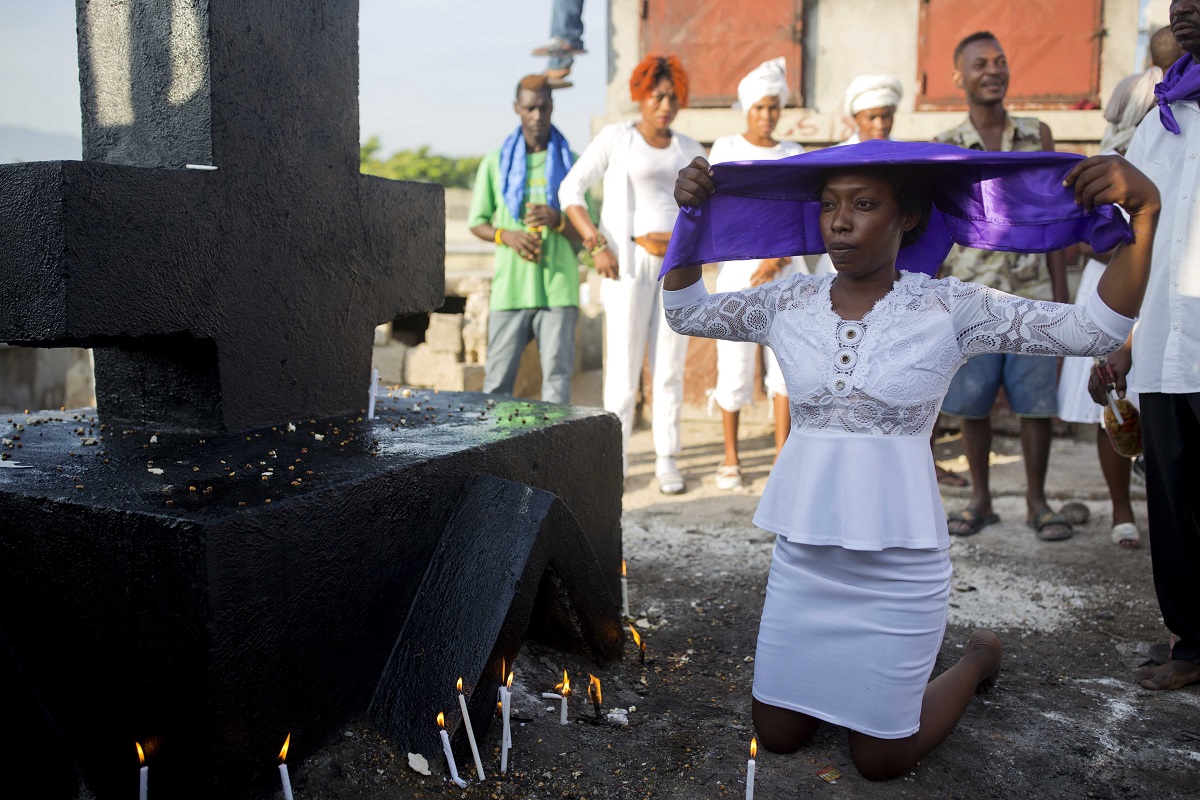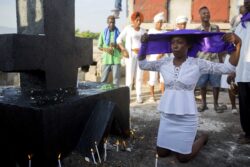Summer 2021
The Ties That Bind
Hoodoo and Vodou’s indelible connection
Published: May 28, 2021
Last Updated: August 31, 2021

Photo by Dieu Nalio Chery, AP Photos
A Vodou practitioner kneels in front of Baron Samedi’s tomb during the 2019 Fèt Gede (Day of the Dead) in Port-au-Prince, Haiti.
Just like “Creole” has numerous definitions, so does Vodou. In Milo Rigaud’s book Secrets of Voodoo, he breaks down the origin of the word: “vo means introspection and du means into the unknown (into the mystery).” New Orleans resident Vodou priestess Sallie Ann Glassman says there’s a distinct difference between Vodou and Hoodoo: “Vodou incorporates what might seem like magical elements, but those elements are contained within a metaphysical framework. The Vodounist serves the lwa [spirits], who answer to their own moral authority. The goal is to balance the different elements and forces of the lwa and to align oneself with the forward and positive progression of the world. While both [Hoodoo and Vodou] are concerned with empowerment, Vodou ceremonies provide a technology for opening the door between worlds and inviting invisible power into the visible world.” The West African cultures to which many victims of the slave trade belonged believed it was natural to acknowledge and communicate with the spirit realm, and thus this interaction became an important aspect of African-descended faiths.
Glassman is one of a handful of white Americans who’s been initiated as a Vodou priestess in Haiti. She’s been practicing for over forty years and over that time has become a quiet force of nature. Divination and channeling spirits are a part of Vodou, and when experiencing a possession trance, Glassman faces the fear that sometimes surfaces during these experiences and uses it to “empower” the occurrence.
Hoodoo materialized in the marshlands of the Sea Islands of Georgia and South Carolina in the 1800s. Many of the enslaved people who were savagely delivered to this area a century before were from West Africa, particularly Sierra Leone. What differentiated their experience from those of other enslaved Africans and their descendants in the South was geographical isolation and relative lack of a white presence. An insular society emerged with its own language and customs, which remained tethered to African traditions. Unlike Vodou, Hoodoo doesn’t try to open a doorway to the spirit world, instead recognizing that the ethereal exists and working in harmony with it. The Low Country answer to the Vodou priestess is the root doctor, who is akin to a shaman, working with the natural world and spirits for results. In some areas with a strong African presence, what would now be deemed superstitions were a part of everyday life. Until the mid-1950s, Hoodoo was practiced out in the open as a “popular” experience. Folks in Beaufort County, South Carolina, lined up to see root doctors Dr. Buzzard and Sheriff Ed McTeer for love potions, healing ointments and conjuring herbs. However, by the mid-twentieth century, these traditional methods started to become associated with the devil, in part because of a connection to emerging blues music, and public practice declined. Hoodoo became something done in back parlors or in the privacy of the home instead of providing a spectacle, but what would be regarded as “old wives’ tales” in mainstream society were and are commonplace in these weathered marshlands. Things like ritual use of “goofer dust,” any of a number of powders used for curses or hexes, or taking care not to throw water out of your back door at night so you wouldn’t hit a spirit were mystic threads that bound this society to its memories of Africa.
Both Louisiana and the Georgia and South Carolina Sea Islands are bound to their West African roots. While Hoodoo flourishes in the shadows of everyday life in the Low Country and Vodou has become a tourist attraction in New Orleans, both are genuine spiritual customs that are often misunderstood. The most salient aspect of Hoodoo and Vodou’s relationship is that they were formed under the pressures of slavery. The spiritual communications that were derived from these practices provided value for the enslaved because they helped them to survive the drudgery of life mentally, physically, and spiritually in this strange new homeland. For true modern-day practitioners, these related folk traditions exist to maintain a familiar and respected connection to the divine and to request the ancestors’ succor.
Sonya Alexander is a freelance journalist who covers film, music, and video games. She’s currently working on a historical fiction book about Louisiana’s free people of color.
